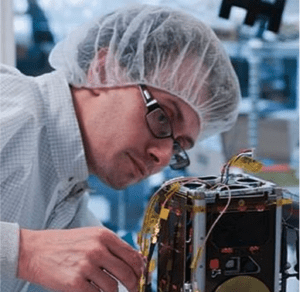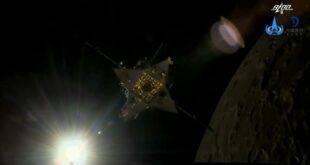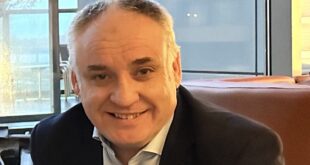By Viktoria Urban

The year’s third Space Café Scotland by Angela Mathis – New Science and Emerging Technology with guest Steve Greenland of Craft Prospect took place on Friday, 17th June.
Steve Greenland is the founder and Managing Director of Craft Prospect, building smart and secure space systems and services, Director of Omanos Analytics, empowering global communities with space data, and a Trustee at The Children’s Wood, where he helped to co-found a local grassroots charity, delivering outdoor learning and activities to over 25 schools and nurseries in the Glasgow area, and a G20 youth club for local young adults promoting equality.
Prior to these, he worked as a Nanoatellite Engineer at STFC, a Senior Systems Engineer at Clyde Space and a PETSAT Design Engineer at SOHLA.
Steve says he used to be an avid reader of the New Scientist and one day applied for a job opportunity advertised on the back of the magazine that said: come to Japan. Once in Japan, he started working on CubeSats, however, he moved back to Scotland two years later to become involved in setting up the first Scottish CubeSat and first Scottish satellite UKube-1.
His entrepreneurial journey started by realising that there was an opportunity to not only build the platforms and the spacecraft but to actually drive some of the new technologies and new payloads forward within Scotland. Steve then set up a missions lab at Strathclyde University to research new technologies. His aim was to set up a business that was going to explore some of the emerging technologies while also being more on the customer side.
Steve claims that the pressures on engineers delivering very small satellites can be quite significant, especially when the budgets or safety nets of much larger programmes are not readily available. With Craft Prospect, he wanted to ensure that the the engineers and the team were bought in and that their efforts were rewarded. The company now has some professional employee ownership investors who are supporting the business to move into the team’s hands, as well as providing significant cash reserves that can be used to invest in the business.
“Sometimes, commercial pressures will just drive the solution rather than the pure science or the pure engineering.”
While growing the business, Steve says they had to identify areas that were immediately commercial to be able to take profits from that and invest in future technologies. The three areas they selected were: mission architecture, supporting those looking to use CubeSats and very small satellites, getting these missions commissioned, launched and operated. The generated revenue is invested into more innovative areas such as the application of AI and machine learning, quantum technologies, and in particular, quantum communications.
“We understand that CubeSats are not going to be the complete solution.”
Steve explains that CubeSats are still very limited, but they are also important gap fillers as they are able to deploy technologies quickly and provide additional coverage. Craft Prospect is focusing a lot of engineering effort on its own complete mission, ROKS (Responsive Operations for Key Services). It brings the different pieces of the business together while also allowing the team to learn about how complete systems can be built together and then turned into modular products which have use beyond the application. The main focus for Craft Prospect is to get ROKS delivered whilst at the same time, supplying parts from its development into other missions.
Steve says Omanos Analytics helps to back up the subjective human experiences with quantitative data from space. It supports journalists and courts in hostile or low infrastructure countries, enabling people to back up the fact that their land was taken away for mining purposes, for example. It also helps with agricultural and pollution monitoring; it can look at the size of prisons and prison cells as well, so that the necessary actions can be taken for these communities.
In terms of sustainability, Steve thinks that there needs to be very rigorous legislation around space traffic control and how satellites’ impact on Earth and humanity is measured. He says that organisations such as the UN, the Space Development Agency in the US and others are a crucial step to ensure that the legislations are enforced on the companies.
To listen to Space Café Scotland’s insights, you can hear the full program here:
Viktoria Urban, contributing Editor at SpaceWatch.Global: After graduating as a Journalist from Edinburgh Napier University, I am now doing an Astronomy and Planetary Science degree at The Open University (Scotland) which has enhanced my already existing love and enthusiasm for space. I am also a member of and a volunteer for several societies both in Hungary and in the UK and write online content on space for multiple companies as well. I hope my science communication will encourage many to find a job in the space sector, whatever their background and highlight important issues to ensure a sustainable space environment for future generations.





